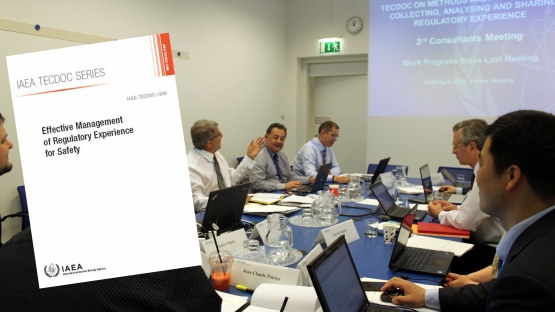Learning from one’s own experience – and from best practices of others – is key for national authorities to identify weaknesses and improve regulatory processes to exercise oversight on the operations of facilities and activities that involve radiation sources. They can now do that better with the help of a new IAEA Technical Document on Effective Management of Regulatory Experience for Safety.
This publication provides initial information on processes to facilitate regulators’ self-reflection about current arrangements in their organizations and exploration of possible measures for enhancement. “It is not practical to establish a standard approach intended to work for all regulators,” said Jean-Claude Poirier, one of the drafters of the document from the Canadian Nuclear Safety Commission. “The national situation, size, characteristics, structure and management practices of different regulatory bodies make it essential to establish organization-specific arrangements improving on what already exists and works well.”
This publication will enable regulators to gain a deeper understanding on the best practices from other regulatory bodies and explore possible measures to realise the benefits from effective management of regulatory experience.
The IAEA safety standards call for regulators and operators to draw and share lessons learned from experience. “While the collection, analysis and sharing of lessons learned from the operation of practices handling nuclear and radioactive material has reached a reasonable status of maturity, this is not at the same level for regulatory experience. The output from a number of Integrated Regulatory Review Service missions has found that the need for managing regulatory experience is not always recognized and understood,” said David Senior, Head of the Regulatory Activities Section at the IAEA.
“This does not mean that regulators do not use experience from their regulatory activities to improve their effectiveness; what it means is that regulators should put in place arrangements to ensure that the practice of collecting, analyzing and managing lessons learned from experience permeates across the organization under the leadership of senior management,” he said.
The document covers the concept of regulatory experience and provides in-depth details on the three parts of a generic process to manage it — collecting, analysing and implementing lessons learned. The methods to assess specific sources of experience such safety and regulatory research, the experience produced by technical support organizations and non-nuclear industry and the management of experience in complex regulatory organizations, are also covered.
“As a regulator in charge of reactor safety studies, one can sometimes feel frustrated when the experience from examining safety files is not translated in a timely manner into the regulatory framework,” said Jacques Devos, of France, an expert who contributed to the drafting of this publication. “I believe the absence of appropriate processes, simple but effective, can prevent the early implementation of improvements to regulations or guides as well as to regulatory practices.”
The document places attention on the linkage between operating experience feedback and regulatory experience. However, while the first focuses on understanding the root cause of events and establishing corrective actions to avoid re-occurrence, the second seeks to pro-actively enhance the regulatory process to help avoid unwanted situations ahead of time.
Additionally, regulatory bodies are also exposed to learning possibilities from other sources of experience. Taking advantage of all these learning possibilities could be beneficial for further enhancing the effectiveness and efficiency of the regulatory process. “For all of this learning to be effective, organizations need to have in place arrangements to collect and analyze relevant information to pro-actively act upon the conclusions of the analysis and to share and disseminate the lessons learned for others to benefit from them,” said Senior.
IAEA experts collaborated with regulators from Bulgaria, Canada, China, Finland, France, Hungary, Germany, Lithuania, Spain, the United Kingdom, the United States of America and Zimbabwe and with one expert of the Joint Research Centre of the European Commission to develop the document.
The IAEA plans to organize a technical meeting by the end of 2020 to further promote a wider understanding on effective regulatory experience. The details of the meeting are available here.





